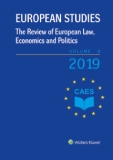Reintegration Post-Brexit (2020–2022): European Union Reorganization – Securing The Public Square of Democracy; Creating a New Global Compact
Reintegration Post-Brexit (2020–2022): European Union Reorganization – Securing The Public Square of Democracy; Creating a New Global Compact
Author(s): K.A.C. O’RourkeSubject(s): Constitutional Law, International Law, Government/Political systems, Politics and law, Present Times (2010 - today), EU-Approach / EU-Accession / EU-Development
Published by: Univerzita Palackého v Olomouci_1
Keywords: Sovereignty; BREXIT; GeoNOMOS Model; Politics of Resentment; The Public Square; Democracy; Heterarchy; European Union; Framework of Liberty; Enterprise of Law; Legal Constitution for Capitalism;
Summary/Abstract: In January 2020, the UK Parliament completed the long-awaited ratification process for the 2018 negotiated EU-BREXIT divorce agreement. After four tumultuous years of UK public contestations, including three general elections in less than five years, the forced resignation of two Prime Ministers after multiple internal Parliamentary votes of ‘no confidence’, the scheduling of an illegal closure of Parliament by the Prime Minister to block BREXIT debates, and the public and divisive ‘Get BREXIT done’ campaign in the December 2019 general election, the UK Conservative Party finally succeeded in securing a majority in Parliament and in moving the agenda. The UK begins a 2020 transition period for its permanent departure from the European Union. Even though the long list of unresolved demands outlined by UK citizens in the original 2016 BREXIT vote focused on “the politics of resentment” and a perceived breach of the social contract inherent in democracy, it is not clear that those domestic BREXIT concerns about social investments in housing, health care services, jobs, and education will even be addressed as part of the UK-EU scheduled negotiations in the transition period. The transition period and its negotiated agreements will be governed by the parameters of The Political Declaration ratified in January 2020. While not legally binding, The Declaration publishes extensive guidelines to govern negotiation processes and outcomes between the parties for regional economic capital and international finance settlements as well as parameters for thirteen sectors for global competition / cooperation including mandatory accession by the UK to certain WTO treaties. Large economic sectors for regional transactions including all transportation /energy sectors, public procurement, intellectual property, financial services and economic capital movement will still be governed by “good faith” requirements embedded in TEU Article 50 moving forward. The domestic BREXIT “politics of resentment” is not unique to the UK as national elections 2016–2018 across the Continent also routinely evidenced this citizen resentment as a widespread phenomenon. Even the EU Parliament elections of May 2019 which had one of the highest voter turnouts across the Continent shifted the internal operation of the EUP for the first time in forty-five years. The European Union as a regional entity is once again faced with issues of differentiated integration as it steps forward to not only reshape economic relations for the Common Market but also to ensure support by its State members for values of participatory democracy and the protection of individual liberty across a range of borders and changing international and regional circumstances. The door is wide open now for EU institutional re-evaluation and re-ordering in this transition period as the UK makes is permanent departure. Former Eastern Bloc States along with Greece and Italy want a more empowered infrastructure for the EU moving forward and putting an end to long standing austerity EU programs imposed by the neoliberal paradigm [c.1980–2010] for capitalist globalization, an ideology that has diminished State sovereignty and eroded democratic societies. These countries are also positioned within the EU to appoint Commissioners and use their influence in new more productive ways that may not always support the EU bureaucracy in Brussels. In December 2019, the Council on the European Union set up a 2020–2024 targeted review process called a Conference on the Future of the EU following extensive 2018 EUP resolutions and citizen reviews demanding more transparency and accountability of EU institutions. The goal is to have needed TEU procedural and treaty changes in place by the 2024 EUP elections. Legitimate expressions of sovereignty and a new paradigm for capitalist globalization for this century are simultaneously in the forefront for the EU even as BREXIT transition negotiations continue. The GeoNOMOS introduced here is a strategic and structural answer for a new EU infrastructure that empowers and supports the 27EU State members and at the same time designs a more balanced compact for capitalist globalization. The EU was created over 45 years ago as a result of a regional treaty agreement and a geographic legal configuration that collaboratively functioned through a scaffolding of “shared sovereignty.” State members as sovereign entities voluntarily granted a certain level of ongoing legal competence to the operation of EU structures and its bureaucracy through national level Constitutional ratification. The range of that “competence” can be amended under the TEU and that process is seriously being evaluated in 2020 by many EU member States. The ripple effect of these institutional challenges to definitions of sovereignty and values of democracy are not confined to the UK alone but rather, suggests that a new definition of the nation State will be required for this century if the State is to remain the sole architect of world order. The GeoNOMOS offers a set of definitions and a strategy for implementation in the post-BREXIT era. It depicts a model of sovereignty for the 21st century based on a framework of liberty and its enterprise of law so that the State at its core can strategically support these two primary functions: [1]secure participatory democracy and individual liberty as it continuously balance all of its essential capital resources [economic, human and social], and [2] participate in the design of a new sustainable global marketplace as a member of the international community of States.
Journal: European Studies - the Review of European Law, Economics and Politics
- Issue Year: 6/2019
- Issue No: 1
- Page Range: 35-72
- Page Count: 38
- Language: English

